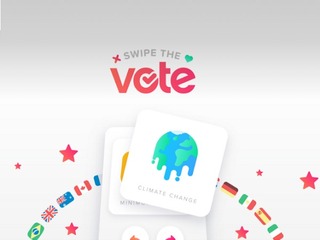
Last week, Tinder announced that it was extending its Swipe the Vote feature, where it takes its swipe left or right functionality, and allows users to vote on different policies, in order to see who they would vote for, to 16 countries around the world. The company was basically letting the global community tell us how they feel about our national election.
Now, just a week before the election, the results are in, and they tell us a lot about how the U.S. would be viewed by the rest of the world during a Clinton or Trump presidency.
In addition to the United States, Tinder users in Argentina, Australia, Brazil, Canada, Chile, Colombia, France, Germany, India, Japan, Korea, Mexico, Russia, Spain and the U.K. were all able to give their opinions on the two candidates for president, and the result was overwhelmingly in favor of Hillary Clinton and her policies.
The numbers weren’t even close for countries outside of the U.S. In terms of policies, 80 percent of global users sided with Hillary Clinton, and nearly the same number, 73 percent, said they would vote for her, if they could. For Donald Trump, only 20 percent agreed with him, and 27 percent said they’d vote for him. If this was a global election, Trump would get trounced.
The results are most interesting for who said they would vote for Trump: Russia is the only country where the majority of users would choose to vote for him. That it was a big majority, with 71 percent. That’s despite 76 percent of Russian users matching with Hillary Clinton based on the issues.
Given the Trump campaign’s alleged ties to Russia, plus the nominees pretty ephusive praise of Vladimir Putin, this doesn’t come as a huge shock. As expected, if Trump were to be elected, we’d have a big change in our relationship with Russia. Whether or not that’s a good thing is a different story.
Of course, these results don’t mean much since none of these users can actually, you know, actually vote, but it does give you an idea about how international relations might go under a Trump presidency.
On the issues, the world wants the United States to have free college tuition and free healthcare (these are two things I can definitely get behind).
The results for who should win in the United States were, as you’d imagine, much closer than they are on the world stage, but maybe not as close as you’d think.
Clinton won pretty handily over Trump, 57 percent to 43 percent on the issues. When it comes to who they are voting for, the results skew more toward what I imagine the actual election will probably look like: 53 percent to 47 percent for Clinton. That’s still a pretty decisive victory for Clinton if that’s the end result.
On the issues, according to Tinder users, more than half want free college tuition, 65 percent want the rich to pay more taxes, and 57 percent want a path to citizenship.
The results also show a big divide on the issue of gun safety, with 53 of men wanting less gun safety laws, and 67 percent of women wanting more.
Tinder goes beyond dating
With Swipe the Vote, Tinder is proving that it can be more than just a dating app. It took the now familiar Tinder functionality of swiping left and right and gave it a different spin, using the userbase of millions of users it has built up to do something more interesting than just allow people to hook up.
This isn’t the only non-dating initiative launched by Tinder this year.
In March, it bought Humin, a contextual relationship and contact management platform. That team was put in charge of an unnamed “new product initiative,” which sounded like it might have to do with connecting people outside of a potential romantic situation.
That product turned out to be Tinder Social, a social planning feature, launched in July, that lets users make plans with Facebook friends, then find other groups to hang out with.
The feature is opt-in, meaning users have to “unlock” it to use it. Once it’s turned on, Tinder Social will allow them to see other friends who have also unlocked it, who they can invite to join their group. Once they have a group set up, users can swipe and match with other groups nearby who are also going out, to create a larger party.
Interestingly, the app is not exactly designed to foster new connections, since, at noon the next day, the group will expires, and any matches disappear.
(Image source: wired.co.uk)


















